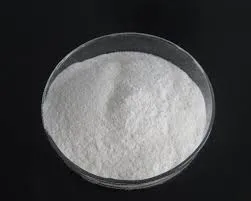
نويابىر . 16, 2024 23:04 Back to list
what is hpmc used for
What is HPMC Used For?
Hydroxypropyl Methylcellulose (HPMC) is a widely utilized cellulose ether that plays a vital role in various industries, including pharmaceuticals, food, cosmetics, and construction. Its unique properties make HPMC an indispensable ingredient in numerous applications, contributing to the functionality, safety, and efficiency of a wide range of products.
Pharmaceutical Applications
In the pharmaceutical sector, HPMC is primarily used as a binder in tablet formulations. Its excellent film-forming abilities help improve the mechanical strength of tablets, ensuring they maintain their integrity during storage and transportation. HPMC is also employed as a controlled-release agent, allowing for the gradual release of active ingredients over time. This is particularly beneficial for patients who require consistent medication levels, as it enhances therapeutic efficacy and patient compliance.
Moreover, HPMC is utilized in the production of hydrophilic and osmotic drug delivery systems. Its water retention properties support the formulation of controlled-release formulations and enhance the bioavailability of poorly soluble drugs. Additionally, HPMC can be found in topical applications, such as gels and ointments, where it acts as a thickening agent that provides desired viscosity and stability to formulations.
Food Industry Applications
In the food industry, HPMC serves multiple functions. It is used as a thickener, stabilizer, and emulsifier, directly contributing to the texture and consistency of various food products. For instance, HPMC is commonly incorporated into sauces, dressings, and bakery products to improve viscosity, prevent separation, and maintain uniform distribution of ingredients.
Another significant application of HPMC in food production is as a fat replacer, offering a healthier alternative to traditional fats while providing a similar mouthfeel and texture. This makes HPMC particularly popular in low-fat and reduced-calorie food items. Its ability to form gels and provide moisture retention is also invaluable in the development of gluten-free products, enabling manufacturers to achieve desired textures that mimic those of conventional baked goods.
what is hpmc used for

Cosmetics and Personal Care Products
HPMC finds considerable use in the cosmetics and personal care industry. It acts as a thickening agent in lotions, creams, and shampoos, contributing to the product's viscosity and enhancing the sensory experience during application. Additionally, HPMC is used as a film-forming agent, helping to create a protective barrier on the skin or hair, which contributes to moisture retention and improves product efficacy.
Moreover, HPMC is often included in skin and hair care formulations for its ability to provide a smooth, silky feel. Its compatibility with various chemical systems allows formulators to create stable, aesthetically pleasing products that cater to consumer preferences.
Construction and Building Materials
In the construction industry, HPMC is used in cement-based materials, tile adhesives, and plasters. Here, it provides increased workability and improves adhesion between materials. The water retention properties of HPMC are crucial, as they help prevent rapid drying of mortar, ensuring adequate curing time and enhanced mechanical strength.
Its role as an additive in coatings improves the spreadability and leveling properties, making it easier to apply and resulting in a smoother finish. Additionally, HPMC's non-toxic nature makes it a preferred choice in eco-friendly construction materials.
Conclusion
Hydroxypropyl Methylcellulose (HPMC) is a versatile compound with significant applications across a range of industries. From pharmaceuticals and food production to cosmetics and construction, its multifunctional properties serve to improve the efficacy and quality of products. As research and innovation continue to advance, the potential applications of HPMC may expand further, reinforcing its importance in modern manufacturing processes. Its safety and effectiveness make it a preferred choice for formulators aiming to enhance product performance while meeting consumer demands. Whether contributing to the development of life-saving medications or improving everyday consumer products, HPMC remains a cornerstone ingredient in diverse sectors.
-
Versatile Hpmc Uses in Different Industries
NewsJun.19,2025
-
Redispersible Powder's Role in Enhancing Durability of Construction Products
NewsJun.19,2025
-
Hydroxyethyl Cellulose Applications Driving Green Industrial Processes
NewsJun.19,2025
-
Exploring Different Redispersible Polymer Powder
NewsJun.19,2025
-
Choosing the Right Mortar Bonding Agent
NewsJun.19,2025
-
Applications and Significance of China Hpmc in Modern Industries
NewsJun.19,2025







